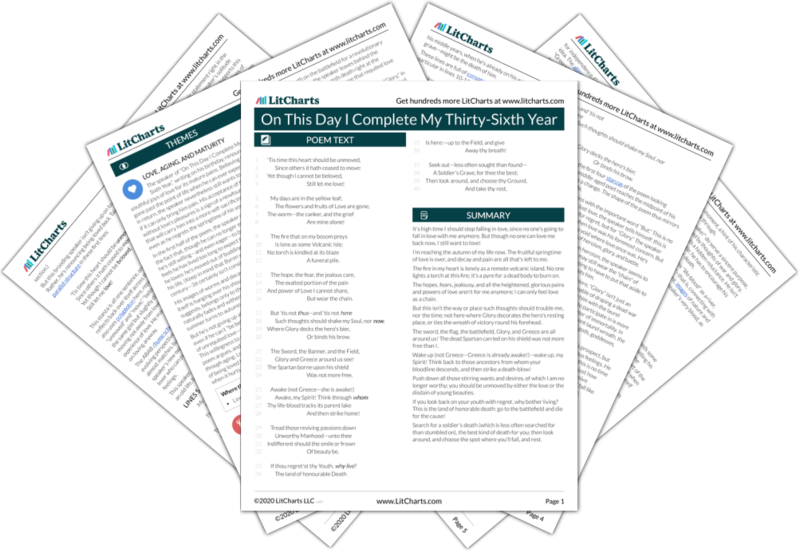
“On This Day I Complete My Thirty-Sixth Year” is the final poem of George Gordon, a.k.a. Lord Byron, composed privately in his journal when he was preparing to join the Greek war of independence in 1824. Writing on his 36th birthday, Byron renounces the youthful joys of love for its mature pains, choosing self-sacrifice over self-indulgence. This turn is mirrored in his choice to go to war: he has lived long enough to seek a collective good over his personal satisfaction or safety (though he’s still got his eye on the honor that choice can provide). Maturity, the poem suggests, is the brave acceptance of change, pain, and death—and the ability to transform those frightening experiences into glory.
|
Get
LitCharts
|

|
The Full Text of “On This Day I Complete My Thirty-Sixth Year”
1'Tis time this heart should be unmoved,
2 Since others it hath ceased to move:
3Yet though I cannot be beloved,
4 Still let me love!
5 My days are in the yellow leaf;
6 The flowers and fruits of Love are gone;
7The worm—the canker, and the grief
8 Are mine alone!
9 The fire that on my bosom preys
10 Is lone as some Volcanic Isle;
11No torch is kindled at its blaze
12 A funeral pile.
13 The hope, the fear, the jealous care,
14 The exalted portion of the pain
15And power of Love I cannot share,
16 But wear the chain.
17 But 'tis not thus—and 'tis not here
18 Such thoughts should shake my Soul, nor now,
19Where Glory decks the hero's bier,
20 Or binds his brow.
21 The Sword, the Banner, and the Field,
22 Glory and Greece around us see!
23The Spartan borne upon his shield
24 Was not more free.
25 Awake (not Greece—she is awake!)
26 Awake, my Spirit! Think through whom
27Thy life-blood tracks its parent lake
28 And then strike home!
29 Tread those reviving passions down
30 Unworthy Manhood—unto thee
31Indifferent should the smile or frown
32 Of beauty be.
33 If thou regret'st thy Youth, why live?
34 The land of honourable Death
35Is here:—up to the Field, and give
36 Away thy breath!
37 Seek out—less often sought than found—
38 A Soldier's Grave, for thee the best;
39Then look around, and choose thy Ground,
40 And take thy rest.
The Full Text of “On This Day I Complete My Thirty-Sixth Year”
1'Tis time this heart should be unmoved,
2 Since others it hath ceased to move:
3Yet though I cannot be beloved,
4 Still let me love!
5 My days are in the yellow leaf;
6 The flowers and fruits of Love are gone;
7The worm—the canker, and the grief
8 Are mine alone!
9 The fire that on my bosom preys
10 Is lone as some Volcanic Isle;
11No torch is kindled at its blaze
12 A funeral pile.
13 The hope, the fear, the jealous care,
14 The exalted portion of the pain
15And power of Love I cannot share,
16 But wear the chain.
17 But 'tis not thus—and 'tis not here
18 Such thoughts should shake my Soul, nor now,
19Where Glory decks the hero's bier,
20 Or binds his brow.
21 The Sword, the Banner, and the Field,
22 Glory and Greece around us see!
23The Spartan borne upon his shield
24 Was not more free.
25 Awake (not Greece—she is awake!)
26 Awake, my Spirit! Think through whom
27Thy life-blood tracks its parent lake
28 And then strike home!
29 Tread those reviving passions down
30 Unworthy Manhood—unto thee
31Indifferent should the smile or frown
32 Of beauty be.
33 If thou regret'st thy Youth, why live?
34 The land of honourable Death
35Is here:—up to the Field, and give
36 Away thy breath!
37 Seek out—less often sought than found—
38 A Soldier's Grave, for thee the best;
39Then look around, and choose thy Ground,
40 And take thy rest.
-
“On This Day I Complete My Thirty-Sixth Year” Summary
-
-
“On This Day I Complete My Thirty-Sixth Year” Themes
-

Love, Aging, and Maturity
- See where this theme is active in the poem.
-

Glory and Sacrifice
- See where this theme is active in the poem.
-
-
Line-by-Line Explanation & Analysis of “On This Day I Complete My Thirty-Sixth Year”
-
Lines 1-4
'Tis time this heart should be unmoved,
Since others it hath ceased to move:
Yet though I cannot be beloved,
Still let me love! -
Lines 5-8
My days are in the yellow leaf;
The flowers and fruits of Love are gone;
The worm—the canker, and the grief
Are mine alone! -
Lines 9-12
The fire that on my bosom preys
Is lone as some Volcanic Isle;
No torch is kindled at its blaze
A funeral pile. -
Lines 13-16
The hope, the fear, the jealous care,
The exalted portion of the pain
And power of Love I cannot share,
But wear the chain. -
Lines 17-20
But 'tis not
thus
—and 'tis not
here
Such thoughts should shake my Soul, nor
now
,
Where Glory decks the hero's bier,
Or binds his brow. -
Lines 21-24
The Sword, the Banner, and the Field,
Glory and Greece around us see!
The Spartan borne upon his shield
Was not more free. -
Lines 25-28
Awake (not Greece—she is awake!)
Awake, my Spirit! Think through
whom
Thy life-blood tracks its parent lake
And then strike home! -
Lines 29-32
Tread those reviving passions down
Unworthy Manhood—unto thee
Indifferent should the smile or frown
Of beauty be. -
Lines 33-36
If thou regret'st thy Youth,
why live
?
The land of honourable Death
Is here:—up to the Field, and give
Away thy breath! -
Lines 37-40
Seek out—less often sought than found—
A Soldier's Grave, for thee the best;
Then look around, and choose thy Ground,
And take thy rest.
-
-
“On This Day I Complete My Thirty-Sixth Year” Symbols
-

Autumn
- See where this symbol appears in the poem.
-

Fire
- See where this symbol appears in the poem.
-

Chains
- See where this symbol appears in the poem.
-

The Spartan
- See where this symbol appears in the poem.
-
-
“On This Day I Complete My Thirty-Sixth Year” Poetic Devices & Figurative Language
-
Alliteration
- See where this poetic device appears in the poem.
-
Allusion
- See where this poetic device appears in the poem.
-
Apostrophe
- See where this poetic device appears in the poem.
-
Assonance
- See where this poetic device appears in the poem.
-
Asyndeton
- See where this poetic device appears in the poem.
-
Caesura
- See where this poetic device appears in the poem.
-
Enjambment
- See where this poetic device appears in the poem.
-
Juxtaposition
- See where this poetic device appears in the poem.
-
Metaphor
- See where this poetic device appears in the poem.
-
Synecdoche
- See where this poetic device appears in the poem.
-
Repetition
- See where this poetic device appears in the poem.
-
Rhetorical Question
- See where this poetic device appears in the poem.
-
-
“On This Day I Complete My Thirty-Sixth Year” Vocabulary
Select any word below to get its definition in the context of the poem. The words are listed in the order in which they appear in the poem.
- Beloved
- Canker
- Bosom
- Lone
- Kindled
- Funeral pile
- Exalted
- 'Tis
- Thus
- Bier
- Spartan
- Borne
- Thee, thou, thy
- Indifferent
- Regret'st
- Sought
-
- See where this vocabulary word appears in the poem.
-
Form, Meter, & Rhyme Scheme of “On This Day I Complete My Thirty-Sixth Year”
-
Form
-
Meter
-
Rhyme Scheme
-
-
“On This Day I Complete My Thirty-Sixth Year” Speaker
-
-
“On This Day I Complete My Thirty-Sixth Year” Setting
-
-
Literary and Historical Context of “On This Day I Complete My Thirty-Sixth Year”
-
-
More “On This Day I Complete My Thirty-Sixth Year” Resources
-
External Resources
-
More of Byron's Poetry — Byron's Poetry Foundation page, including a biography and links to more of his poems.
-
Portraits of Byron — Some of the many portraits of Lord Byron, in which he poses as the quintessential Romantic hero: brooding, melancholy, and passionate.
-
A Reading of the Poem — Hear "On this day I complete my thirty-sixth year" performed aloud.
-
A Short Introduction to Byron — An overview of Byron's life and works by the scholar Germaine Greer.
-
The Poem in Manuscript Form — See the poem in Byron's own handwriting.
-
-
LitCharts on Other Poems by Lord Byron
-















